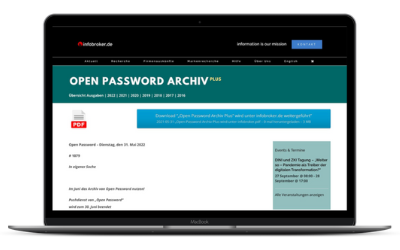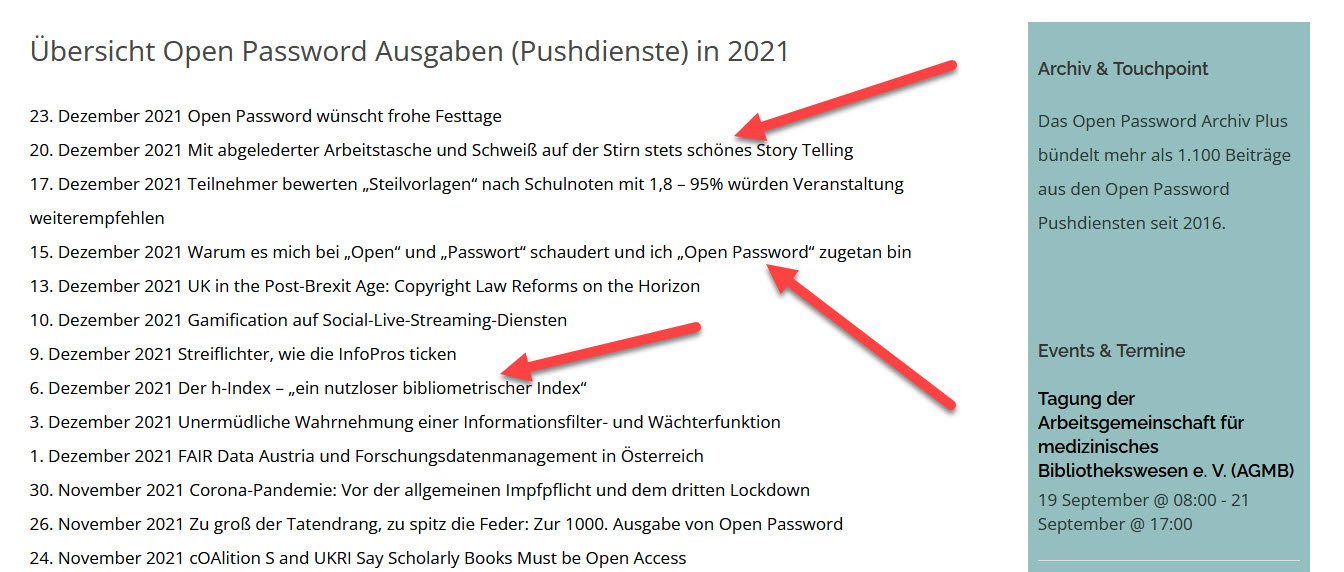Open Password – Mittwoch, den 24. November 2021
#1002
1000 Ausgaben Password – Debatten – Matthias Staab – Evelin Reklies – Infobroker Jena – Joachim C. Bartels – Hong Kong
Outsell – cOAlition S – UK Research and Innovation – Scholarly Books – Open Access – Julia Kostova – Open Research – Academic Book Publishing – CC License – Embargo Period – Intellectual Rights – Arts and Humanities – Social Sciences – Author Pays Model – University Presses – Libraries – Book Publication Charge – De Gruyter – Bloomsbury Academic – University of California – CUP – TOME – MIT – Ubiquity Press – Harvard – Stanford – OAPEN – Europe – US – Consortia – Collaborative Models – Digital Infrastructure – Cost Control – Bibliodiversity
I.
1000 Ausgaben Open Password
- Matthias Staab
- Evelin Recklies
- Joachim C. Bartels
- Titel
Outsell´s November Contribution: cOAlition S and UKRI Say Scholarly Books Must be Open Access – By Julia Kostova
1000 Ausgaben Open Password:
Briefe (1)
Viele Debatten angestoßen,
angefeuert und gegengefeuert
Lieber Herr Bredemeier,
Ich lese gerade die 1000. Ausgabe von Password.
Sie haben da über die vielen Jahre hin ein Riesenkunststück vollbracht, viele Debatten angestoßen, oft angefeuert und ab und an gegengefeuert, kritisiert und ermutigt. Manchmal anstößig, oft genug für den Nichtbetroffenen amüsant – und immer den Status quo relativierend: Es ginge doch auch anders und vor allem: besser?!
Ihnen daher viele Grüße und ein großes Merci beaucoup!
Cordialement – Best regards – Viele Grüße, Matthias Staab, Head –
Published Information Access – Knnowledge Management & Learning,
SANOFI-AVENTIS RECHERCHE & DÉVELOPPEMENT, CHILLY-MAZARIN – France
1000 Ausgaben Open Password:
Briefe (2)
Hoffen auf viele weitere Ausgaben
Lieber Herr Bredemeier,
herzlichen Glückwunsch Ihnen und allen Ihren Mitstreitern zur 1000. Ausgabe!
Auch ich möchte mich für die vielen interessanten Beiträge bedanken und hoffe auf noch viele weitere Ausgaben von Open Password.
Bleiben Sie gesund!
Viele Grüße sendet Evelin Reklies, INFOBROKER Jena
1000 Ausgaben Open Password:
Briefe (3)
Ein Prost auf die weiteren 1000!
Lieber Dr. Bredemeier,
1000 Ausgaben Open Password – 35 Jahre Password
BIIA Gratulieren herzlichst!
Prost auf die weiteren 1000!
Ihr Joachim C Bartels, Managing Director,
Business Information Industry Association, Hong Kong
Outsell´s November Contribution*
cOAlition S and UKRI Say
Scholarly Books Must be Open Access
By Julia Kostova, VP & Lead Analyst
Bearbeite dies, um Text einzufügen.
Julia Kostova
Having first targeted journals, major European funders are now targeting research in book form to align with the principles of open research. The aim of cOAlition S and UKRI is nothing less than the reshaping of academic book publishing based on new open access policies.
_____________________________________________________
What to Know and Why It Matters
_____________________________________________________
UK Research and Innovation (UKRI) and cOAlition S have both announced that they are extending their open access principles, previously focused on journals, to academic books.
cOAlition S released a set of recommendations, rather than a policy or a specific mandate, that aims to align research publishing in book form with the principles of Plan S already implemented for journals. The coalition acknowledges that book publishing is quite different from journal publishing, so a different, more flexible approach is needed to drive OA in books. However, the key principles in the recommendations for books echo those in journals. Specifically, they include immediate OA publication with a minimal — ideally zero — embargo period, publication under a CC-BY license, and publication with “sufficient intellectual rights retained” by the authors or their institutions.
UKRI, a signatory to Plan S, also released an updated OA policy, which contains a new provision for academic books. It mandates that, starting in January 2024, research published in book form must publish open access under any CC license, with an embargo period of no more than 12 months. The UKRI policy offers more specificity than the recommendations of cOAlition S, including a summary of the types of content covered by the policy, routes of compliance, and exemptions.
Overall, both announcements signal a broadening of these funders’ OA policies and a directional shift toward OA in the book space. That sphere is notoriously complex due to the highly local nature of the publishing industry and the lack of funding in disciplines traditionally organized around long-form output, such as in the arts and humanities.
_____________________________________________________
Analyst Rating: Neutral
_____________________________________________________
The open research movement has gained a lot of momentum over the last couple of years, with big funders playing an increasingly critical role in driving the transition to OA. These recent policy updates from cOAlition S and UKRI signal both the direction of travel and the desired destination, adding to the OR momentum. However, the immediate practical impact is likely to be limited given that only ~5% of the total output that the two organizations fund publishes in book format, which represents less than 10% of all scholarly books published every year.
Further, the issues involved in transitioning books sustainably and responsibly to an OA model within the current ecosystem have yet to be hashed out. These early recommendations lack detail about practical and technological requirements and will be supplanted with additional implementation guidelines at a later point.
For example, disciplines where the book is the main unit of currency, like the arts, humanities, and social sciences, do not have access to the same levels of funding as the hard sciences, making author-pays models difficult to adopt. In fact, in the humanities, most research projects are not funded by grants to begin with.
The costs to produce a scholarly book are considerably higher than those of the journal articles dominant in science, technology, engineering, and medical fields. Books in the arts, humanities, and social sciences also have a longer content “half-life” and sales tail: They build impact over a longer period, which means that it takes longer to recoup the cost investment; accordingly, academic book publishers, like university presses, rely heavily on backlist revenues. Furthermore, the digital infrastructure to support OA books at a larger scale is still largely lacking. Finding pragmatic models that take into account the complexity of the book publishing world in a range of disciplines is not an easy task.
At the same time, there is a growing consensus that current academic book publishing is not sustainable. Ever-diminishing monograph sales generate insufficient revenue to cover growing costs and complexity. Libraries — the main market for academic books — are moving away from collection-building at the same time as demand for digital resources is skyrocketing, even in disciplines with a historical attachment to print.
It is these conditions that have encouraged academic publishers, institutions, and libraries to experiment with new business and publishing models, even before the new OA policies, in recognition of the changing tides and of the fact that a one-size-fits-all approach is not appropriate here. Examples include the book publication charge (BPC) models offered by many publishers, like De Gruyter and Bloomsbury Academic; subsidy-based models like the University of California’s Luminos; embargoed/delayed models such as CUP’s Flip it Open; membership-based models like TOME; subscribe[1]to-open variations like MIT’s Direct to Open; or mixed models, like those of Ubiquity Press, which offers BPC and membership as well as infrastructure and related services. However, if there is some consensus about the destination, there are more questions than answers about how to get there.
_____________________________________________________
Winners and Losers
_____________________________________________________
OA books are still in the early stages of development, making it difficult to predict the impact of the updated cOAlition S and UKRI policies. In practice, given the relatively small book footprint of cOAlition S, the immediate impact is likely to be limited, but the extended policies add to the momentum in the OA books space.
Publishers with existing OA programs, including large university publishers, commercial publishers, or OA publishers, stand to benefit from new OA funding at UKRI. Specialized publishers or those that do not have OA programs (a list that includes prestigious venues like Harvard UP and Stanford UP) could find themselves noncompliant, which would prevent funded researchers from publishing with them. In fairness, following consultation with stakeholders, the UKRI has added a “specialist publisher” exemption not to limit author choice, but these are the kinds of details that need to be worked out by all funders.
The issue of OA infrastructure is a real hindrance as well, but it is also an opportunity to band together around existing infrastructure organizations that offer such services, like the nonprofit OAPEN or large publishers like DeGruyter.
_____________________________________________________
What’s Next
_____________________________________________________
There is an opportunity to rethink the current model, and funding should follow. UKRI has committed £47 million per year to support the OA transition of books, and most other cOAlition S members, if not all of them, have similarly allocated funds for OA books. How things pan out will vary significantly by geography. A more unified approach is underway in European countries; in the US, where the landscape is fragmented and complex, library consortia and collaborative models between publishers and libraries around OA books are already emerging as possibly more effective paths forward than cOAlition S’s policy.
Given the potential knock-on effect of cOAlition S’s policies, e.g., on the North American market (which is the largest buyer of monographs), broader consultation with stakeholders in the ecosystem — especially those with a small OA footprint and from a wide range of disciplines — would be appropriate regarding implementation. We see cOAlition S focusing less on the specifics of the models and more on outcomes, but it is vital to recognize that a multiplicity of outcomes and models is key to successfully reimagining academic book publishing.
_____________________________________________________
Essential Actions
_____________________________________________________
We expect that the shift to OA in the academic books space will accelerate, driven as much by the need to address problems in the current environment as by policies. Considerable investment in OA is already taking place and is likely to extend to the book space, if on a more limited scale than in the journals market. In the short term, we see disruption but also opportunities. Outsell’s essential actions for providers addressing these markets include the following.
Focus on Infrastructure. OA publishing needs robust digital infrastructure that is still patchy or lacking in the book world, especially among smaller publishers. This is a good time for publishers to evaluate infrastructure challenges and opportunities, including partnerships and improvements to existing systems and workflows.
Follow the Money. Academic book publishers will see investment in OA and will face opportunities to rethink the book ecosystem. At the same time, cost control is a key priority for stakeholders. A financial modeling of possible scenarios could prove beneficial given the changes in the marketplace and policy landscape.
Explore New Models. Cognizant of bibliodiversity, cOAlition S is focused on outcomes rather than the details of OA books models. This is an opportune moment for stakeholders like publishers, libraries, funders, and the research community as a whole to pilot new models, particularly collective models that are not based on book publishing charges. Organizations that are further ahead on this transformational journey have made their model details publicly available, which will facilitate the exchange of knowledge.
Outsell (London) ist the international partner of Open Password
Open Password
Forum und Nachrichten
für die Informationsbranche
im deutschsprachigen Raum
Neue Ausgaben von Open Password erscheinen dreimal in der Woche.
Wer den E-Mai-Service kostenfrei abonnieren möchte – bitte unter www.password-online.de eintragen.
Die aktuelle Ausgabe von Open Password ist unmittelbar nach ihrem Erscheinen im Web abzurufen. www.password-online.de/archiv. Das gilt auch für alle früher erschienenen Ausgaben.
International Co-operation Partner:
Outsell (London)
Business Industry Information Association/BIIA (Hongkong)
Anzeige

FAQ + Hilfe



